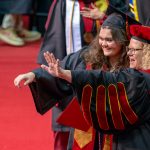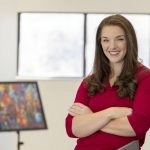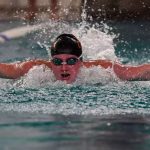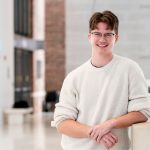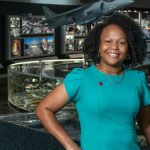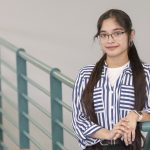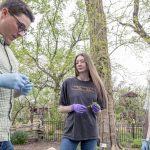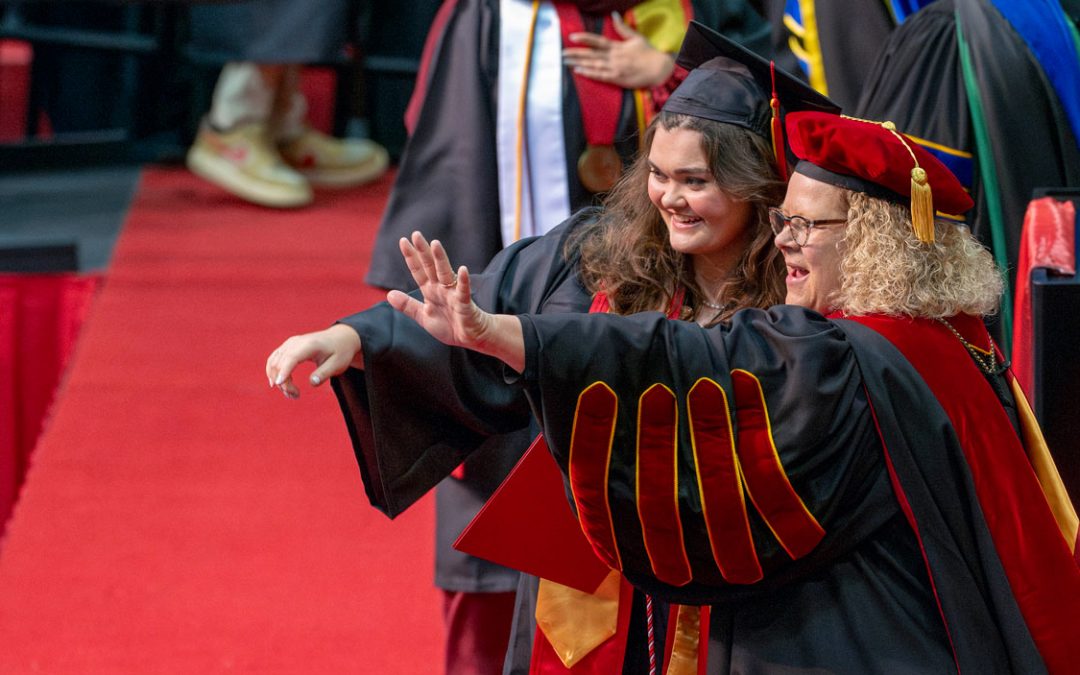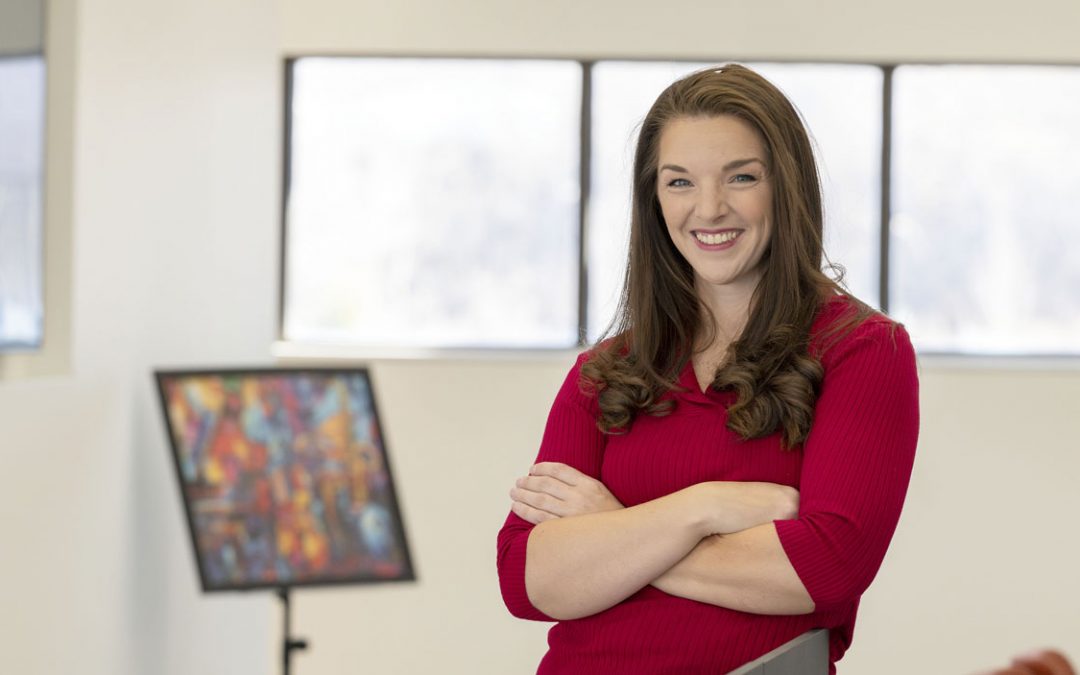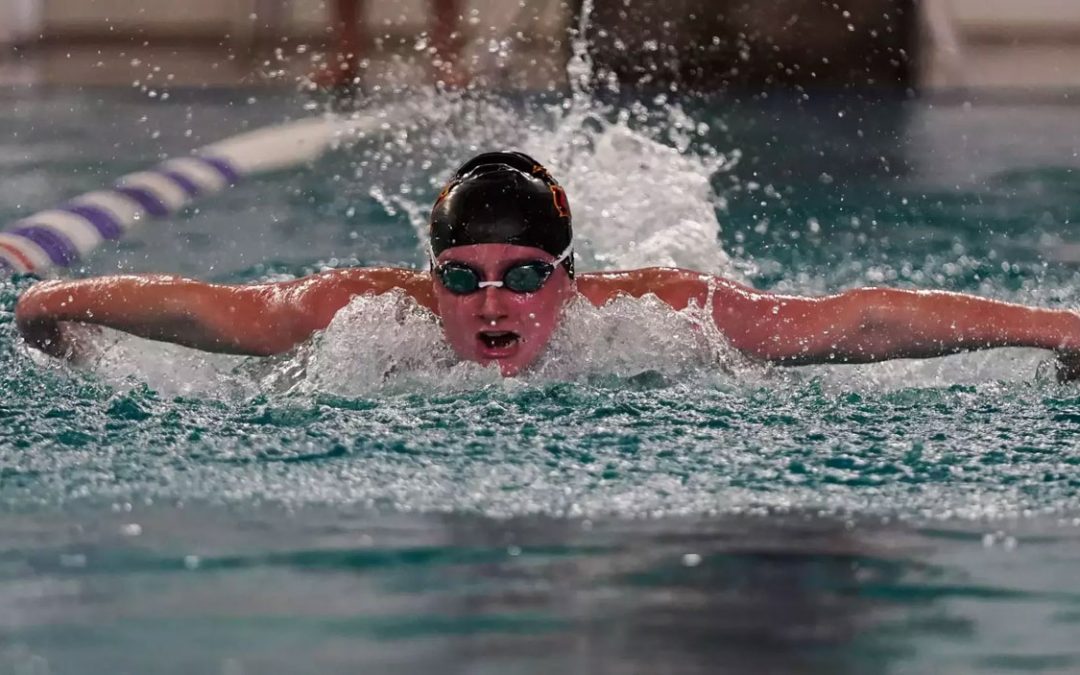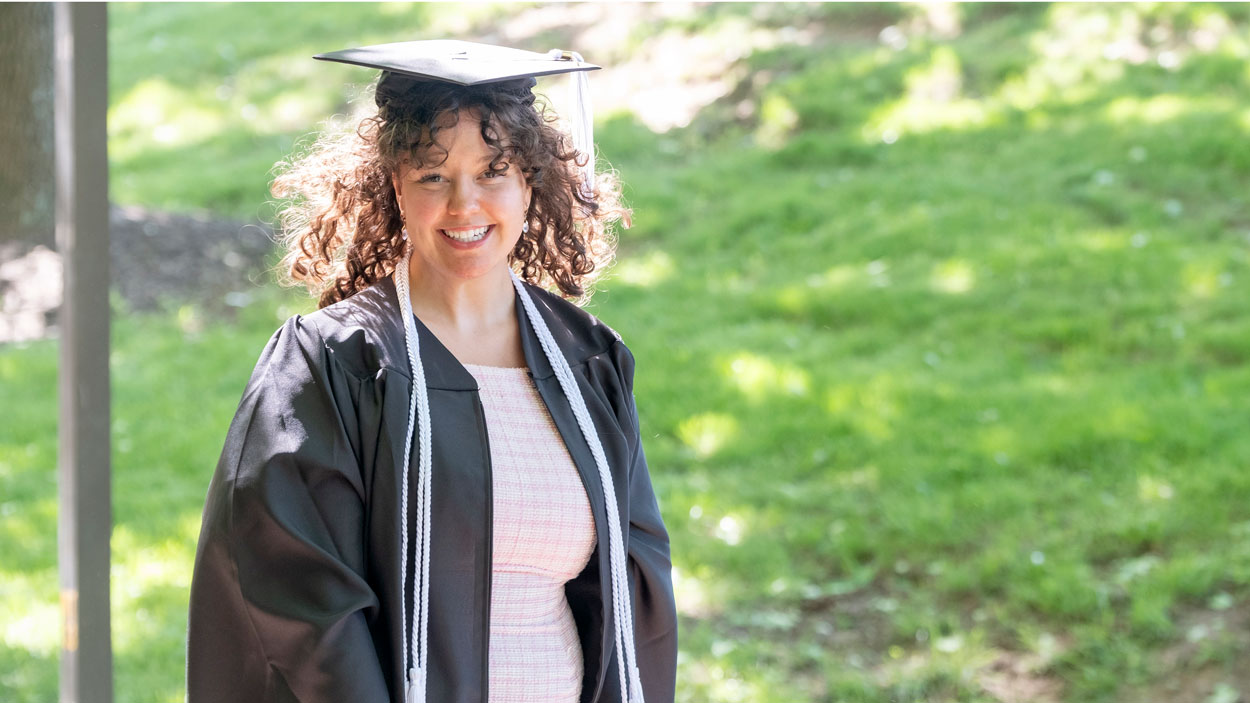
Grace Puchalski earned her degree in physics with distinction for her research and will begin pursuing her master’s degree in mathematics this fall. (Photos by Derik Holtmann)
Grace Puchalski recognized the joy and satisfaction her parents experienced last month watching her walk across the commencement stage as the University of Missouri–St. Louis celebrated graduates of the College of Arts and Sciences during a May 17 ceremony at the Mark Twain Athletic Center. She felt it, too.
The day provided a long-awaited opportunity for them to get pictures of their daughter in a cap and gown after she finished high school early and skipped out on participating in her graduation ceremony.
But more than that, Puchalski knew they’d followed along with the ups and downs of her college experience over the past six years, and they might well have had some of the same doubts she did about whether she would make it to the stage.
“It feels like it took forever, but it feels like all of it’s been worth it at this point,” Puchalski said.

Grace Puchalski walks across the commencement stage on May 17. Puchalski received her degree in physics with distinction for her research. She served as an assistant for Professor Erika Gibb and is continuing to intern at NGA’s Geoscience and Artificial Intelligence Application Lab.
She earned her bachelor’s degree in physics with distinction for her research and is set to begin pursuing her master’s degree in mathematics this fall at UMSL. But to arrive there took twice transferring schools and changing majors while also working to rebuild confidence in her own intellectual abilities along the way.
Puchalski had always been a good student growing up in St. Peters, Missouri, and attending high school at Fort Zumwalt South. She finished a semester early and enrolled at Lindenwood University, intent on majoring in chemistry with plans of one day going to medical school.
It didn’t take long for her to start re-evaluating those ideas.
“I think I failed my first biology test, like my first class,” said Puchalski, who struggled with the memorization the course required.
In the meantime, she was excelling in Calculus I and thought that might signal she needed to go a different direction.
“I’m not a memorizer, I’m a problem solver,” she said. “I thought, ‘Oh, maybe I’ll be an engineer.’”
Puchalski opted to transfer to Missouri University of Science and Technology, but neither the school nor engineering proved to be the right fit either. She struggled in the classroom and soon found herself reconsidering everything all over again.
She was certain she couldn’t remain in Rolla, so she instead decided to return home and enroll at UMSL, thinking she’d give physics a try.
“I am originally from the St. Louis area, so it was a school that offered a good physics program and that was affordable,” Puchalski said. “I found out that I really like it here. I like how the department is very personal. It feels like the people at UMSL genuinely want you to succeed. The professors are there for more than just school. They see you as a person. You’re not just a student. And I have not felt that anywhere else.”
Faculty members such as Erika Gibb, Sonya Bahar and Mohi Saki in the Department of Mathematics, Physics, Astronomy and Statistics, provided Puchalski great support right when she felt like she was reeling.
“I think the first or second semester I was here, it was very evident that my confidence had been run through,” she said.
Puchalski struggled in her Calculus II course but did better in Calculus III. She points to the A she earned in Differential Equations as important for restoring her belief in her abilities.
“That was the moment that I really was like, ‘OK, I got this. This is where I’m supposed to be, and that past part didn’t define my academic career,’” she said.
She’s been a fixture on the honor roll ever since.
“She has exhibited great perseverance,” Bahar said.
In addition to her work in the classroom, Puchalski also spent roughly two years working as an undergraduate research assistant with Gibb, investigating the composition of comets and what that might reveal about the origins of solar system.
More recently, she has served as an intern with the Geoscience and Artificial Intelligence Application – or GAIA – Lab, an unclassified lab overseen by the National Geospatial-Intelligence Agency at Moonshot Labs in T-REX in downtown St. Louis.
Puchalski had known little about geospatial technology when she started the internship last year, but she was quickly drawn to the complexity of the problems and their practical applications.
“I didn’t realize how much stuff relied on geospatial technology, especially because the department that we work with is the people that are basically responsible for updating the GPS system every few years,” she said. “It feels like you’re watching something that everybody’s really reliant on, and you see how it actually works.”
Puchalski earned praise for her performance as an intern and had an opportunity to share some of her work at this spring’s Undergraduate Research Symposium.
“She has really taken a leadership role, not only in a complex project involving modeling the earth’s gravitational field, but also in helping to teach and mentor newer students on the team,” Bahar said.
Puchalski has also helped other students through her work as a supplemental instructor, working most recently in a course taught by Saki.
The Department of Mathematics, Physics, Astronomy and Statistics presented her with one of its Student Engagement Awards for her outstanding contributions to research and teaching.
Puchalski has also received the Richard D. Schwarts Scholarship, the Physics and Astronomy Scholarship and the Physics and Astronomy Alumni Scholarship, as well as an UMSL Scholarship, while working toward her degree.
She is glad to continue her internship at the GAIA Lab while she begins pursuing her master’s degree and expects to tailor her program as much as she can toward geosciences and geospatial technology, recognizing the job potential that exists in St. Louis’ growing geospatial ecosystem.
Puchalski has tremendous gratitude to faculty members in the Department of Mathematics, Physics, Astronomy and Statistics for where she is today.
“I’ve worked my tail off to get to where I am at this point, and I put a lot of time into it,” she said. “I truly think it was the support system that I had that I was able to do that.”


